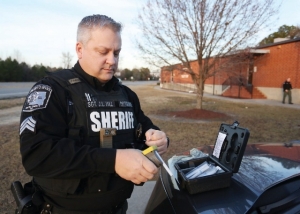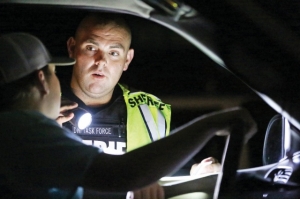Four inches of separation: Holiday travel and safety
By Brandon Davis
Published in News on December 22, 2016 9:53 AM

News-Argus/CASEY MOZINGO
Sgt. Jayson Hill changes the mouthpiece on a portable breath test, a preliminary test given to drivers who are suspected of having alcohol in their systems. If alcohol is present, a driver is then given a standardized field sobriety test to identify clues of impairment.

News-Argus/CASEY MOZINGO
Jonathan Batchelor with the Wayne County Sheriff's Office DWI Task Force speaks to a driver at a checkpoint set up outside of Mount Olive earlier this year.
The centerline on a road spans a mere 4 inches in width.
That does not leave much space between a motorist and an impaired driver this holiday season.
Statistics from AAA Carolinas and the North Carolina Department of Transportation showed 13 people died on North Carolina roads between last year's Christmas season and New Year's Eve.
Of those, five were alcohol-related.
Nearly 3 million North Carolinians will travel more than 50 miles during the holidays, according to a press release from AAA. Tiffany Wright, public relations manager for AAA in Charlotte, said Dec. 23 to Jan. 2 is the busiest period for holiday travelers.
It is also the time people drink large quantities of alcohol in celebration -- and then some get behind the wheel of a car.
"We encourage folks to, obviously, make a plan if you plan on drinking," Ms. Wright said. "So that we don't see any fatalities due to drunk driving."
The same goes for Wayne County.
Tragedy hit the county last Thursday when Johny Robert Watson, 17, died at Vidant Medical Center in Greenville. Watson's Jeep was struck by Chief Master Sgt. Hector Soler, 47, of Seymour Johnson Air Force Base, Dec. 10.
Soler was driving 70 mph when he smashed into the back of Watson's vehicle on South George Street around 11:30 p.m., according to the Goldsboro Police Department
The police report showed Soler had a blood alcohol content of .16 at the time of the wreck.
Wayne County Sheriff's Office Sgt. Jason Hill, supervisor of the DWI Task Force, said the county falls in the top 25 out of 100 counties in alcohol-related fatalities statewide.
The county currently sits at No.17 with an average of seven deaths over a four-year period from 2010 to 2014.
The task force was created in October of last year when a study found the county ranked 13th in the state in deaths related to impaired driving.
"It's not DWIs. That's alcohol-related fatalities," he said. "That is people that have died from an alcohol-related crash whether they were a passenger, driver, pedestrian."
Hill said the National Highway Traffic Safety Administration's Fatality Analysis Reporting System keeps statistics on 23 categories including DWIs, alcohol-related serious injuries, crashes and others.
"Traffic safety -- period -- is somewhat lacking in Wayne County," he said. "The biggest thing I can say, as far as impaired driving goes, is if you drink, don't drive. It's as simple as that."
The simplicity of the decision not to drink and drive can quickly become more difficult the more alcohol a person drinks.
Fortunately, there are options to get home safely.
Uber, a transportation service created in 2009, gives people the opportunity to have a driver to take them home. Susan Hendrick, a spokesperson for the company's New York site, said Uber offers a phone app for people to download, set up a profile and simply tell an Uber driver where you are located.
Mrs. Hendrick said an Uber driver will pick you up, but she said people in smaller cities in eastern North Carolina may have a longer wait time due to lower numbers of drivers.
"Again and again, we see that when people have a reliable alternative to get home safe, they choose not to drink and drive," she said. "No matter where you are, what time it is, if there is an Uber driver available, it is just a tap on your phone, and you can get home safe."
Uber recently partnered with Mothers Against Drunk Driving to begin a campaign called, "Leave the Keys." Mrs. Hendrick said the company encourages people to leave car keys at home, call Uber or designate a driver before they go to a party during the holidays.
Lyft, a transportation network company created in 2012, also opens its doors for people to avoid drinking and driving. Much like Uber, Lyft allows people to download an app and let a Lyft driver know where you are.
Maj. Dwayne Dean, over the Operations Bureau of the police department, said there are other plans as well for driving safely and avoiding a DWI.
Dean said a person needs to choose a reliable designated driver. He said designated drivers sometimes decide midway through the night that they want to drink also, but he said they must stay alcohol-free.
"They need to be somebody that a person trusts to uphold their end of the bargain not to be drinking," he said.
Dean also suggests using public transportation such as Uber, Lyft and the city's Webbtown Taxi, which is located at 616 E. Elm St.
His third tip urges people to stay at a hotel or at a friend's house if a person chooses to drink at those places, and he said a group should designate someone to take car keys from people at a party.
But his concern centers mainly around the safety of innocent drivers and holiday travelers.
Dean said every driver and passenger should wear a seat belt, and he stressed that passengers should wear a seat belt whether they are seated in the front of the car or in the back, according to North Carolina law.
He said people will travel from out of state to visit families this Christmas, and he said they may not be familiar with certain back roads and road stop signs.
Dean said the police will patrol areas to look for drunk drivers during the holidays, but he asks people to wear a seat belt even if they have not drank alcohol.
Statistics from the police department show there have been 243 DWIs so far this year in the city. Police have recorded 17 already this month.
Hill and his deputies will be out the rest of the month looking for drunk drivers.
"It's not one thing that we look for," Hill said. "It's a totality of things. But we are looking. And we're going to be in the area where alcohol is. And we're looking because we want to get them off the road as soon as possible."
Hill said he and three officers arrested 236 people for DWIs in the county from the beginning of the task force until September of this year. He said officers stopped nearly 2,500 cars during that time, and he said every 10th car possessed an impaired driver.
"You could look at it as, possibly, every 10th car on the road is an impaired driver," Hill said. "That's scary to think about."
